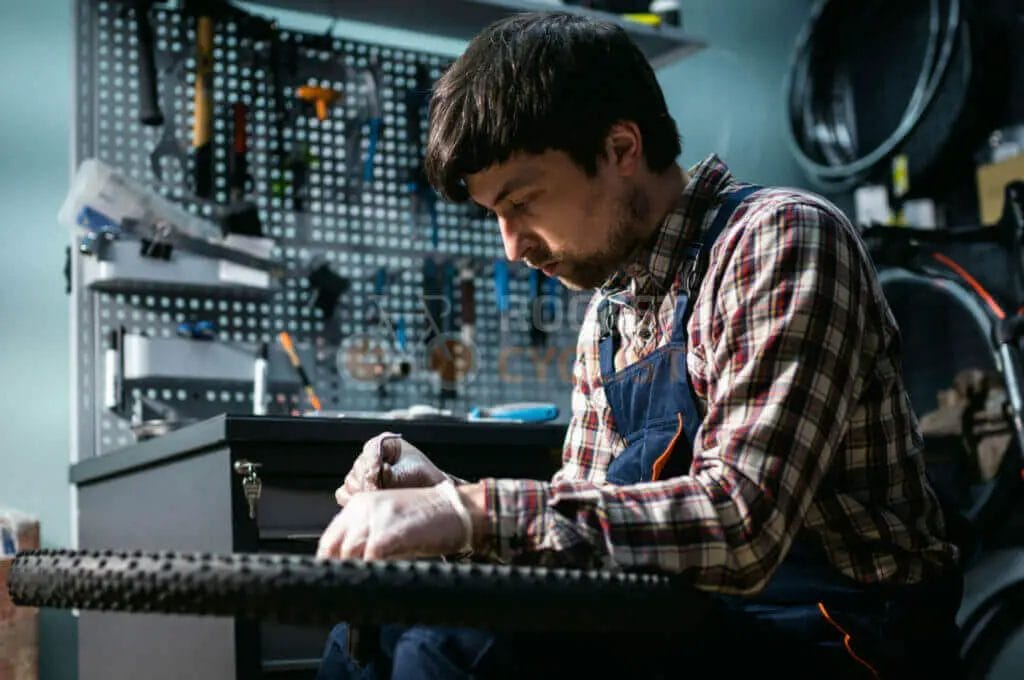Last Updated on January 7, 2024 by Vinson Lozano

Are you passionate about bicycles and eager to turn your love for bikes into a rewarding career? If so, becoming a certified bike mechanic may be the perfect path for you. As a certified bike mechanic, you will play a crucial role in ensuring the safety and performance of bicycles. Whether it’s repairing brakes, adjusting gears, or building custom bikes, your expertise will be invaluable to fellow cycling enthusiasts. Plus, being a certified bike mechanic comes with numerous benefits such as job security and the opportunity to work in a field that aligns with your passion. In this article, we will guide you through the steps to become a certified bike mechanic and the exciting career opportunities that await you.
What does a certified bike mechanic do?
As a certified bike mechanic, your role is to provide maintenance, repair, and customization services for bicycles. You will be responsible for diagnosing issues with bikes, such as faulty brakes or gears, and performing the necessary repairs. Additionally, you may assemble new bikes, tune them for optimal performance, and assist customers in choosing the right components and accessories. Your expertise in bike mechanics will ensure that bicycles are safe and function properly. Whether it’s fixing a flat tire or building a custom racing bike, your skills as a certified bike mechanic will contribute to the enjoyment and safety of cyclists everywhere.
Benefits of becoming a certified bike mechanic
As a certified bike mechanic, you will enjoy a range of benefits that come with your expertise. Firstly, your certification demonstrates your knowledge and skill in bike mechanics, increasing your credibility and marketability. This can lead to excellent job prospects and opportunities for advancement within the industry. Additionally, being certified allows you to command higher pay rates for your services. Moreover, you will have the satisfaction of knowing that you are providing valuable assistance to cyclists by keeping their bikes in optimal condition, ensuring their safety and enjoyment. Lastly, as a certified bike mechanic, you may have access to continued education and professional development opportunities, allowing you to stay updated with the latest advancements in the field and expand your skills even further.
Education and Training
To become a certified bike mechanic, you’ll need to acquire the necessary education and training. Enroll in a reputable bike mechanic training program that offers courses on bike maintenance, repair, and diagnostics. Look for programs that are accredited by recognized industry organizations.
Gaining hands-on experience is also crucial. Seek out apprenticeships or internships with experienced bike mechanics or local bike shops. This will allow you to apply your knowledge in real-world scenarios and further develop your skills.
During your training, it’s essential to familiarize yourself with the essential tools for a bike mechanic. These include wrenches, screwdrivers, spoke wrenches, tire levers, and more. Invest in high-quality tools that will last longer and provide accurate results.
By completing the right education and training, you’ll be well-prepared for the certification process and ready to pursue a successful career as a certified bike mechanic.
Enroll in a reputable bike mechanic training program
To become a certified bike mechanic, enrolling in a reputable bike mechanic training program is essential. Look for programs that offer comprehensive courses on bike maintenance, repair, and diagnostics. Accredited programs are preferred as they ensure high-quality education and training.
During your training, you will learn about the different components of a bicycle, how to properly inspect and diagnose issues, and how to perform various repairs and adjustments. You will also gain knowledge about tools and equipment used in bike maintenance.
By enrolling in a reputable training program, you will receive expert guidance from experienced instructors who can impart industry-standard techniques and best practices. This hands-on learning experience will prepare you for the challenges of a career as a certified bike mechanic.
Gaining hands-on experience through apprenticeships or internships
To further enhance your expertise as a certified bike mechanic, gaining hands-on experience through apprenticeships or internships is highly recommended. These opportunities allow you to apply the knowledge and skills you gained during your education and training in a real-world setting.
By working alongside experienced professionals in bike shops or repair centers, you will have the chance to observe and participate in actual repairs and maintenance tasks. This practical experience will deepen your understanding of different bike models, troubleshooting techniques, and customer service.
Additionally, apprenticeships or internships provide valuable networking opportunities, allowing you to establish connections within the industry. These connections can lead to future job offers or recommendations.
Embrace these opportunities to gain real-world experience and set yourself apart as a competent and well-rounded certified bike mechanic.
Tools and Equipment
As a certified bike mechanic, having the right tools and equipment is essential for effectively repairing and maintaining bicycles. You’ll need a set of essential tools that include wrenches, screwdrivers, tire levers, a chain tool, and a pedal wrench. These tools are necessary for tasks like adjusting brakes, tightening bolts, removing pedals, and fixing flats.
Investing in quality equipment is also crucial for providing top-notch service to your customers. This includes a bike stand to securely hold the bicycle during repairs, a truing stand for straightening bent rims, specialized tools for different types of bikes (such as suspension forks or disc brakes), and a torque wrench to ensure accurate tightening of components.
By having the proper tools and equipment at your disposal, you can confidently take on any repair or maintenance job that comes your way.
Essential tools for a bike mechanic
As a certified bike mechanic, it is crucial to have the right tools to efficiently perform repairs and maintenance tasks. Some essential tools you’ll need include wrenches, screwdrivers, tire levers, a chain tool, and a pedal wrench. These tools are necessary for adjusting brakes, tightening bolts, removing pedals, and fixing flats.
In addition to these basic tools, investing in quality equipment will ensure that you can provide top-notch service to your customers. Consider acquiring a bike stand to securely hold the bicycle during repairs, a truing stand for straightening bent rims, specialized tools for different types of bikes (such as suspension forks or disc brakes), and a torque wrench to accurately tighten components. Having the proper tools and equipment will allow you to confidently tackle any repair or maintenance job that comes your way.
Investing in quality equipment
Investing in quality equipment is essential for a certified bike mechanic. By having reliable tools, you can provide top-notch service to your customers and ensure the longevity of their bikes. When it comes to purchasing equipment, prioritize durability and functionality. Look for wrenches, screwdrivers, tire levers, a chain tool, and a pedal wrench made from high-quality materials that can withstand heavy usage. Consider investing in specialized tools for specific types of bikes, such as suspension forks or disc brakes. Additionally, a bike stand and truing stand will make repairs more efficient and accurate. Remember, quality equipment may come with a higher price tag initially but will pay off in the long run with increased productivity and customer satisfaction.
Certification Process
To become a certified bike mechanic, you must go through a certification process. The requirements for certification may vary depending on the certifying organization, but generally, you will need to meet certain criteria. This may include completing a designated number of training hours or completing a specific curriculum. Once you have met the requirements, you will need to take a certification exam to demonstrate your knowledge and skills in bike mechanics. The exam may cover topics such as bike maintenance, repairs, and troubleshooting. Passing the certification exam will validate your expertise and make you an accredited bike mechanic, increasing your job prospects and credibility in the industry.
Requirements for certification as a bike mechanic
To become a certified bike mechanic, you must fulfill certain requirements. These requirements may vary depending on the certifying organization, but they typically involve completing a designated number of training hours or a specific curriculum. It is important to enroll in a reputable bike mechanic training program that covers all the necessary topics and skills. Additionally, gaining hands-on experience through apprenticeships or internships can greatly enhance your knowledge and expertise. Remember to invest in essential tools for a bike mechanic, as they are crucial for performing repairs and maintenance tasks. Lastly, you will need to pass a certification exam that tests your knowledge and skills in bike mechanics. Meeting these requirements will validate your expertise and set you on the path to becoming a certified bike mechanic.
Taking the certification exam
Taking the certification exam is the final step towards becoming a certified bike mechanic. This exam is designed to test your knowledge and skills in bike mechanics. It typically covers topics such as bike components, troubleshooting common issues, and performing repairs and maintenance tasks.
To prepare for the exam, review and study the material covered in your training program. Practice working with different types of bikes and familiarize yourself with different tools and equipment. It’s important to be confident in your abilities and have a solid understanding of bike mechanics.
During the exam, you will be assessed on both theoretical knowledge and practical skills. Be prepared to answer multiple-choice questions and demonstrate your ability to perform specific tasks, such as adjusting gears or replacing brake pads.
Passing the certification exam will validate your expertise as a bike mechanic and open up opportunities for career advancement and professional development. So, make sure to dedicate time to study and practice before taking the exam.
Career Opportunities
As a certified bike mechanic, you will have a wide range of career opportunities available to you. Bike shops are always in need of skilled mechanics, and many larger cities have multiple bike shops where you can find employment. These shops may specialize in different types of bikes, such as road bikes or mountain bikes, allowing you to focus on your area of interest.
Alternatively, you may choose to start your own bike repair business. This will give you the freedom to set your own hours and work with clients directly. You can also offer additional services such as bike fitting or custom builds to expand your business.
By becoming a certified bike mechanic, you open doors to a rewarding career in an industry that is growing rapidly.
Job prospects for certified bike mechanics
As a certified bike mechanic, you will have excellent job prospects in the growing bicycle industry. Bike shops are always in need of skilled mechanics to service and repair bikes for their customers. With your certification, you will stand out from other applicants and have a higher chance of landing a job at a reputable bike shop.
Additionally, there are opportunities for advancement within the field. As you gain experience and expertise, you may be able to move into more specialized roles or even become a lead mechanic. You can also explore opportunities to work with professional teams or in bike manufacturing companies.
Overall, being a certified bike mechanic opens doors to a fulfilling career with plenty of opportunities for growth and advancement in the bicycle industry.
Working in bike shops or starting your own business
If you choose to work in a bike shop, there are plenty of opportunities for certified bike mechanics. You can join an established bike shop and work with a team of experienced professionals, servicing a variety of bikes and helping customers find the right solutions for their cycling needs. This allows you to gain valuable experience and expand your skills while being part of a supportive environment.
Alternatively, you may consider starting your own bike repair business. As a certified mechanic, you have the knowledge and skills to attract customers who need their bikes serviced or repaired. With careful planning and marketing, you can build a loyal customer base and create a successful business venture.
Both options offer the satisfaction of working directly with bikes and helping others enjoy their cycling experiences. Choose the path that aligns with your goals and interests, whether it’s working within an established shop or pursuing your entrepreneurial dreams.
Conclusion
Becoming a certified bike mechanic opens up a world of opportunities in the cycling industry. By investing in education and training, gaining hands-on experience, and obtaining certification, you can gain the skills and knowledge needed to excel in this field.
As a certified bike mechanic, you’ll have the advantage of job security and competitive pay in an industry that continues to grow. Whether you choose to work in a bike shop or start your own business, your expertise will be in demand as more people turn to cycling for transportation, fitness, and recreation.
Additionally, being a certified bike mechanic allows for continued education and professional development opportunities. With new technologies and advancements constantly emerging in the cycling world, you can stay up-to-date and expand your skills to ensure you’re always providing the best service to your customers.
So don’t wait any longer – take the first step towards becoming a certified bike mechanic and embark on an exciting career in the world of bicycles!
Benefits of being a certified bike mechanic
As a certified bike mechanic, you can enjoy a range of benefits that come with your expertise and certification. Firstly, job security is a significant advantage. With increasing interest in cycling, there is a growing demand for skilled mechanics to service and repair bikes. This ensures that you will have a stable income and consistent employment opportunities in the cycling industry.
Secondly, being a certified bike mechanic can lead to competitive pay. Your specialized skills and knowledge make you a valuable asset to employers or customers who are willing to pay more for quality service.
Lastly, becoming certified opens up opportunities for career progression and growth. You can pursue advanced certifications, work in different settings such as bike shops or even start your own business, giving you the flexibility and independence to further your career in the world of bicycles.
Continued education and professional development opportunities
As a certified bike mechanic, you have the opportunity to continue your education and pursue professional development in your field. This can involve attending workshops, seminars, or conferences that focus on the latest advancements in bike technology and repair techniques. You can also choose to specialize in specific areas such as mountain bikes, road bikes, or electric bikes, further enhancing your skills and knowledge. Additionally, manufacturers often offer training programs for their specific products, allowing you to become an expert in a particular brand. By staying up-to-date with industry trends and continuously improving your skills, you can position yourself as a sought-after professional in the world of bike mechanics.


